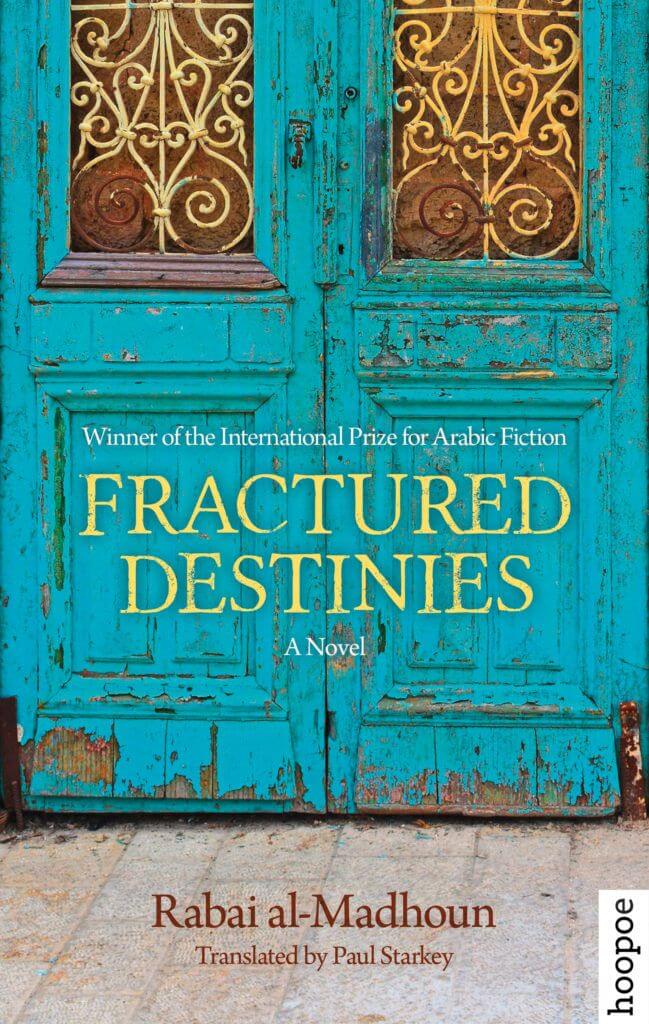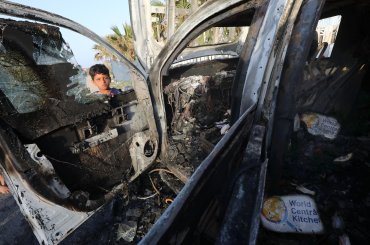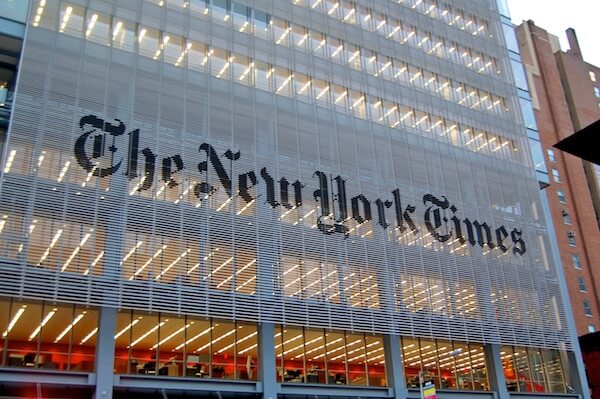FRACTURED DESTINIES
By Rabia al-Madhoun, Translated by Paul Starkey
264 pp. Hoopoe $18.95
To be Palestinian in Israel is to inhabit an oxymoronic existence: simultaneously at home and in exile. Which is more painful: to be forced to abandon your homeland, or to remain, watching strangers erase all traces of your culture and history?
This dilemma forms the crux of Rabai al-Madhon’s Fractured Destinies, a nested narrative tracing the interconnected stories of the Dahman family. Walid, born in al Majdal Asqualan but raised in a refugee camp in Gaza, has returned from his emigre life in London with his wife Julie, who hopes to return her Palestinian-Armenian mother’s ashes home to Acre. Meanwhile, in Jaffa, Walid’s cousin Jinin wrangles with her husband Bassim, who chafes at his inability to gain residency. Jinnin is writing (and Walid reading) a novel about her father Mahmoud Dahman, known as “The Remainer” for his refusal to leave after the Nakba, a decision which has earned him both praise and scorn. Al-Madhoun’s characters all grapple with the question: who is at home and who is in exile?

The novel unfolds in four movements, slipping back and forth in time and occasionally veering into a fantasy future, when Israel has “become a homeland for everyone.” (p. 234) As Walid and Julie travel through Jerusalem, Haifa, and Al-Majdal; Julie, the only one of the characters to have been raised abroad, is enchanted by the beauty of the land, but fails to appreciate Walid’s sharp discomfort and anger at its “creeping Judaization”( p. 30); street signs emphasizing the Jewish history of neighborhoods with no acknowledgement of their former Palestinian inhabitants; a door… “dotted with holes, just as the geography of Palestine is dotted with Jewish settlements.” (p. 65)
Likewise, Jinnin and Bassim struggle to find common ground. Bassim has an American passport but cannot get residency or employment in Israel; Jinnin is devoted to her life in Jaffa and refuses to move to the West Bank. Having met online while living in the United States, their marriage has become a metaphor for Palestinian displacement.
“…their love, which had opened a path to return to the homeland, only to separate them when they’d arrived. My God, it’s ridiculous that exile should bring us together and the homeland should drive us apart.” (p. 103)
Jinnin, who works to promote a common citizenship between Jews and Arabs, refuses to abandon her work and her claim on Jaffa. Leaving Israel would be cowardly, and a betrayal of her birthright:
“I won’t leave. If Bassim decides to leave, let him travel alone. I won’t leave what’s mine, and what I’ve built just to give it all up for immigrants from other countries to inherit from me while I’m still alive.” (p. 90)
Yet for Bassim, living in Israel “…was his exile that greeted him in the morning and accompanied him on his sometimes hesitant tours of the country, while he sought the right to reside in his own country from the strangers who had occupied it.” (p. 80) Like Walid he, “will not come back to this country to live in it as a stranger.” (p. 54)
Jinnin’s refusal to leave Jaffa, even in the face of losing Bassim, echoes the stubbornness of her father “The Remainer”. In the chaos of the Nakba, Mahmoud Dahman begged his family and friends not to abandon their homes, stealthily returning to Israel two months later. Though Walids’ family disparage Mahmoud for “living with the Jews”, there is also grudging pride in his stubborn, almost supernatural resistance. Yet Mahmoud’s greatest victory is in sowing a new generation of Palestinians in Israel, “Now we’ve planted our feet in the county and have a branch there…It’s not just Mahmoud who has stayed—the sons and daughters he will have in the future will also remain there!” (p. 116) Jinnin’s own “remaining” is thus a continuation of her of father’s legacy.
Characters ponder co-existence, yet the weight of the Occupation always intervenes. Julie wistfully imagines living side by side with Jewish neighbors in al-Majdal, seeming to ignore the rights her husband would lose. Near the Orthodox quarter of Mea Shaerim, Walid, Julie, and their guide are threatened by a group of Jewish youth for driving on the sabbath. The illusion of friendliness from an Israeli immigration agent is shattered by abusive shrieks when Jinnin timidly asks if Bassim can get a work permit.
The Nakba and the Holocaust are both indelibly imprinted on the land and its inhabitants.“The Remainer’s” neighbor Aviva is haunted by memories of the Babi Yar massacre, and Walid visits Yad Vashem, asking, “God to have mercy on them twice: once as victims of the Nazis, and a second time as people used by those who traded on their tragedy.” ( p. 232) As “The Remainers” wife Husniya muses, “The Germans burned the hearts of the Jews, and the Jews have burned ours in turn. What have we done that God burns both our hearts?” (p. 66)
A lyrically rich portrait of contemporary Palestinian society, peppered with references to real life historical and political figures (including the author!) and indelible images of pain.



Many thanks for this review of “Fractured Destinies”, Lesley
I look forward to reading and absorbing it. The cover is stunning ~ I am sure that the gift within is even more so.